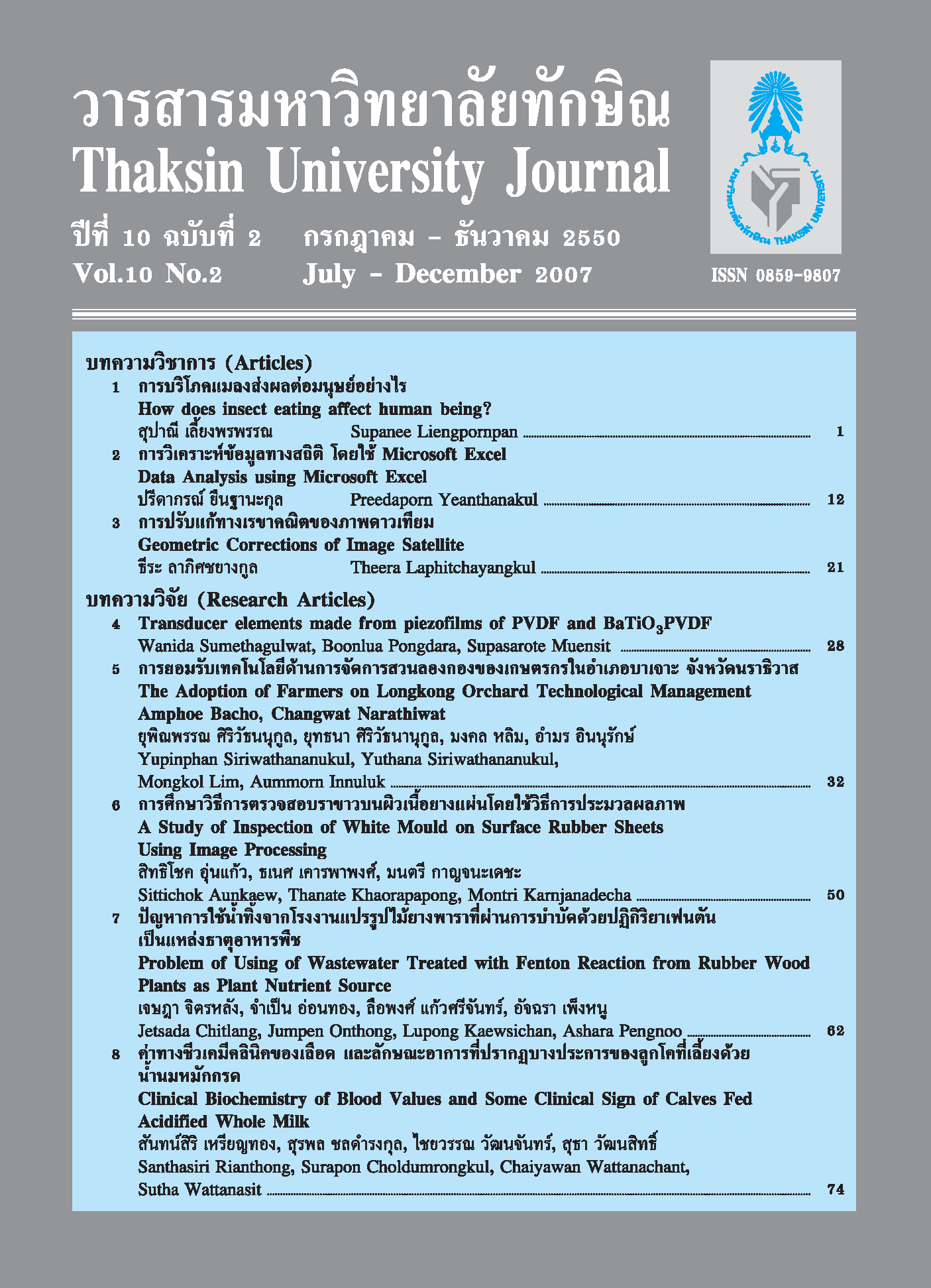การยอมรับเทคโนโลยีด้านการจัดการสวนลองกองของเกษตรกรในอำเภอนาเจาะ จังหวัดนราธิวาส
Main Article Content
Abstract
The objectives of the study were to investigate the socio-economic characteristics of a group of farmers, and how these characteristics related to their adoption of technological methods for managing their Longkong orchards. The 3oo of 1,198 Longkong orchard farmers in Amphoe Bacho, Changwat Narathiwat were randomly sampled as a group of this study. The results revealed that the farmers generally had a medium level of acceptance towards adopting technological management methods such as preparing trees for flowering, watering and flowering activation, high productivity management and product quality improvement, harvesting and storage of the Longkong. Ten data factors, land holding area, land used for agriculture, land area in Longkong plantation, family income, income beyond agriculture, non-productive land area, total Longkong production, yield of Longkong per rai, and attitudes and motivation toward the Longkong plantation had highly significant (p<0.01) and significant (p<0.05) positive correlation with adoption of technological management methods; When analyzed by Pearson Correlation. Four factors, age, Longkong price, productive land area and distance of time to the orchard had negative highly significant (p<0.01) and significant (p<0.05) correlation with adoption of technological management methods for the Longkong orchard.
Chi-square test was used to analyze ten of fifteen discontinuous data factors, sources of knowledge, use of technology transfer center, loaning fund situation, natural water resources, soil fertility, disease outbreaks, outbreak of insects, outbreak of Microchlora sp, outbreak of weed and outbreak of animal pest were found to have a relation (p<0.05) with adoption of technological management methods.
There were five factors, family income, total Longkong production, Longkong price, attitudes and motivation toward Longkong plantation had highly significant (p<0.01) influence on the adoption of technological management methods for the Longkong orchard when tested by multiple regression analysis.
The main recommendation based on this study is that government agencies such as the Narathiwat Provincial Agriculture Office, the Agriculture Office in Amphoe Bacho, the Provincial Horticulture Office, the Department of Agriculture, Universities and other Agricultural Technology Colleges should pay more attention to various activities for transferring technology to farmers such as Longkong productivity quality control, providing more suggestions for such things as bio-fertilization and pest management and control by such things as using Azadirachta sp extract, facilitating Longkong selling through farmers’ groups or co-operatives, and encouraging better dissemination of this kind of information through documents, radio, and television shows.
การวิจัยนี้มีวัตถุประสงค์เพื่อศึกษาลักษณะปัจจัยทางสังคม เศรษฐกิจ และสภาพการปลูกลองกอง จิตวิทยา กายภาพ ชีวภาพและการยอมรับเทคโนโลยีการจัดการสวนลองกองของเกษตรกร ตลอดจนการหา ค่าความสัมพันธ์ และอิทธิพลของปัจจัยบางประการกับการยอมรับเทคโนโลยีการจัดการสวนลองกอง โดยสุ่มตัวอย่างเกษตรกร 300 ราย จากจำนวนเกษตรกรปลูกลองกอง 1,198 ราย อำเภอบาเจาะ จังหวัดนราธิวาส ผลจากการศึกษา พบว่า เกษตรกรให้ ความคิดเห็นต่อการยอมรับเทคโนโลยีด้านการจัดการสวนลองกอง ซึ่งประกอบด้วย การเตรียมสภาพต้นให้พร้อมสำหรับ การออกดอก การชักน้ำ และการกระตุ้นการออกดอก การจัดการเพื่อเพิ่มปริมาณและปรับปรุงคุณภาพผลผลิต ลองกอง การเก็บเกี่ยวและการเก็บรักษาผลลองกอง อยู่ในระดับปานกลาง สำหรับการหาค่าความสัมพันธ์ของตัวแปร โดยวิธี Peason กับการยอมรับเทคโนโลยีการจัดการสวนลองกอง พบว่า มี 10 ตัวแปร ที่มีค่าความสัมพันธ์ทางบวกอย่างมีนัยสำคัญยิ่ง และมีนัยสำคัญทางสถิติ คือ ขนาดเนื้อที่ถือครอง ขนาดพื้นที่ทำการเกษตร ขนาดพื้นที่ปลูกลองกอง รายได้ของครอบครัว รายได้จากนอกภาคเกษตร ขนาดพื้นที่สวนที่ยังไม่ให้ผลผลิต ผลผลิตของลองกองทั้งหมด ผลผลิต ลองกองต่อไร่ ทัศนคติที่มีต่อการปลูกลองกอง และแรงจูงใจ สำหรับตัวแปรอีก 4 ตัวแปร มีค่าความสัมพันธ์ทางลบ อย่างมีนัยสำคัญยิ่ง และมีนัยสำคัญทางสถิติกับการยอมรับเทคโนโลยีด้านการจัดการสวนลองกอง ตัวแปรทั้ง 4 คือ อายุ ราคาลองกองที่ขายได้ ขนาดพื้นที่สวนที่ให้ผลผลิต และระยะเวลาเดินทางไปสวนลองกอง
สำหรับการหาความสัมพันธ์ของตัวแปร ได้ใช้ Chi-square test หาค่าความสัมพันธ์กับการยอมรับเทคโนโลยี ด้านการจัดการสวนลองกอง พบว่า มี 10 ตัวแปร ที่มีความสัมพันธ์ คือ แหล่งความรู้ที่ได้รับ การใช้บริการศูนย์ ถ่ายทอดเทคโนโลยี ภาวะการกู้ยืม แหล่งน้ำธรรมชาติ ความอุดมสมบูรณ์ของดิน การระบาดของโรค การระบาดของ แมลง การระบาดของหนอนชอนไช การระบาดของวัชพืช และการระบาดของสัตว์ศัตรูพืช
นอกจากนี้ พบว่า มีตัวแปร 5 ตัว คือ รายได้ของครอบครัว ผลผลิตของลองกองทั้งหมด ราคาผลผลิตลองกอง ทัศนคติที่มีต่อการปลูกลองกอง และแรงจูงใจ มีอิทธิพลต่อการยอมรับเทคโนโลยีด้านการจัดการสวนลองกอง เมื่อ ทดสอบโดยการวิเคราะห์ถดถอยพหุ
ข้อเสนอแนะของการศึกษา คือ หน่วยงานที่เกี่ยวข้อง เช่น สำนักงานเกษตรจังหวัดนราธิวาส สำนักงานเกษตร อำเภอบาเจาะ สำนักงานพืชสวนจังหวัด กรมวิชาการเกษตรมหาวิทยาลัยและวิทยาลัยเกษตรกรรมต่างๆ ควรให้ความ สนใจถ่ายทอดความรู้ให้เกษตรกรมากขึ้นทั้งในเรื่องของการควบคุมคุณภาพผลผลิตลองกอง แนะนำการใช้ปุ๋ยชีวภาพให้ มากขึ้น ให้ความรู้เรื่องการป้องกันโรค และแมลง โดยการใช้สารสกัดสะเดา การจำหน่ายผลผลิตลองกองในลักษณะ ของกลุ่มหรือสหกรณ์ให้มากขึ้น ควรใช้สื่อเอกสาร วิทยุ โทรทัศน์ เผยแพร่เทคโนโลยีใหม่ๆ เกี่ยวกับเรื่องของลองกองให้ มากขึ้น


